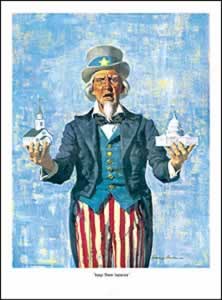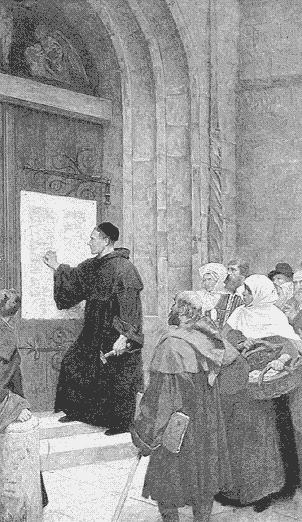(Excerpts) If you're part of secular America – that is, if you're an atheist, an agnostic, a religious liberal or even a mainstream believer who thinks religion should be kept out of politics and vice-versa – then you should be very afraid of what the Republican party has in store for you in 2012.
No news there, you might say. The Republicans, as we all know, have been in thrall to the Christian right since the Reagan era. But there's something new, something more intolerant, something truly ugly in the works. And if you don't believe me, let's start with Tim Pawlenty, unassuming governor of Minnesota in his day job, fire-breathing Christian warrior and aspiring presidential candidate in his spare time.
"I want to share with you four ideas that I think should carry us forward," Pawlenty said on Friday at the annual gathering of the Conservative Political Action Committee, or CPAC. After invoking "basic constitutional principle and basic common sense," he continued:
Pawlenty didn't say. But he oozed mild-mannered hatred for anyone who doesn't share his beliefs. In a bizarre closing in which he invoked the civil war general (and future president) Ulysses S Grant as some sort of rough-around-the-edges, proto-Tea Party role model, Pawlenty trashed anyone who attended "Ivy League schools" or who go to "chablis-drinking, brie-eating parties in San Francisco". (You can watch Pawlenty's address at CSPAN.org, starting at the 1:38:30 mark.) It sounded like a parody of Pat Buchanan's famous 1992 "culture war" speech. Except that Pawlenty is one of the Republicans' two most plausible candidates for president in 2012.
The other would be former Massachusetts governor Mitt Romney, who fell far short of the prize in 2008, but whose legendary self-discipline has put him in a strong position for 2012.
The trouble is that Romney has already declared war on secular America. In December 2007, you may recall, he delivered a speech in which he defended his Mormon religion at a time when he was under assault from evangelical Christians. It was, in many respects, a sensible plea for religious tolerance.
Except that Romney called for tolerance only among believers, explicitly omitting non-believers. "Any believer in religious freedom, any person who has knelt in prayer to the Almighty, has a friend and ally in me," Romney said. "And so it is for hundreds of millions of our countrymen: we do not insist on a single strain of religion – rather, we welcome our nation's symphony of faith."
As New York Times columnist David Brooks wrote the next day, "Romney described a community yesterday. Observant Catholics, Baptists, Methodists, Jews and Muslims are inside that community. The nonobservant are not. There was not even a perfunctory sentence showing respect for the nonreligious." Brooks – a conservative, though a secular one – warned that Romney was calling for "a culture war without end".
Romney and Pawlenty are the early front-runners for the Republican presidential nomination, and it's a good thing: the most frequently mentioned potential fringe candidates are even worse. If you have not seen Sarah Palin asking God to build a natural-gas pipeline in Alaska, well, do yourself a favour right now (see also her recent speech at the Tea Party convention). Mike Huckabee, a Baptist minister, personifies the Christian right in its purest form. "I hope we answer the alarm clock and take this nation back for Christ," Huckabee said in 1998. There is no reason to think he's changed his mind.
Barack Obama, in his inaugural address, said that "our patchwork heritage is a strength, not a weakness. We are a nation of Christians and Muslims, Jews and Hindus – and non-believers. We are shaped by every language and culture, drawn from every end of this Earth."
It is that simple, inclusive vision that we're in danger of losing if Romney or Pawlenty – or, God help us (so to speak), Palin or Huckabee – is elected president in 2012. In truth, the founders made it clear in the first amendment that we need not just freedom of religion, but freedom from religion, especially given that 79% of Americans believe in miracles.
"While we assert for ourselves a freedom to embrace, to profess, and to observe, the religion which we believe to be of divine origin, we cannot deny an equal freedom to them whose minds have not yielded to the evidence which has convinced us," wrote James Madison.
In contrast to Madison, the Republicans propose a theocracy of believers. It is an assault not just on anyone who isn't one of them, but on the American idea, and on liberal democracies everywhere. Source
No news there, you might say. The Republicans, as we all know, have been in thrall to the Christian right since the Reagan era. But there's something new, something more intolerant, something truly ugly in the works. And if you don't believe me, let's start with Tim Pawlenty, unassuming governor of Minnesota in his day job, fire-breathing Christian warrior and aspiring presidential candidate in his spare time.
"I want to share with you four ideas that I think should carry us forward," Pawlenty said on Friday at the annual gathering of the Conservative Political Action Committee, or CPAC. After invoking "basic constitutional principle and basic common sense," he continued:
"The first one is this: God's in charge. God is in charge ... In the Declaration of Independence it says we are endowed by our creator with certain unalienable rights. It doesn't say we're endowed by Washington, DC, or endowed by the bureaucrats or endowed by state government. It's by our creator that we are given these rights."Never mind Pawlenty's fundamental and no doubt deliberate misreading of the founders' intent. (Thomas Jefferson, the primary author of the Declaration of Independence, is well-known for having cut up a Bible to remove all supernatural references to Jesus.) How, in practice, does Pawlenty envision "God's in charge" as a governing principle?
Pawlenty didn't say. But he oozed mild-mannered hatred for anyone who doesn't share his beliefs. In a bizarre closing in which he invoked the civil war general (and future president) Ulysses S Grant as some sort of rough-around-the-edges, proto-Tea Party role model, Pawlenty trashed anyone who attended "Ivy League schools" or who go to "chablis-drinking, brie-eating parties in San Francisco". (You can watch Pawlenty's address at CSPAN.org, starting at the 1:38:30 mark.) It sounded like a parody of Pat Buchanan's famous 1992 "culture war" speech. Except that Pawlenty is one of the Republicans' two most plausible candidates for president in 2012.
The other would be former Massachusetts governor Mitt Romney, who fell far short of the prize in 2008, but whose legendary self-discipline has put him in a strong position for 2012.
The trouble is that Romney has already declared war on secular America. In December 2007, you may recall, he delivered a speech in which he defended his Mormon religion at a time when he was under assault from evangelical Christians. It was, in many respects, a sensible plea for religious tolerance.
Except that Romney called for tolerance only among believers, explicitly omitting non-believers. "Any believer in religious freedom, any person who has knelt in prayer to the Almighty, has a friend and ally in me," Romney said. "And so it is for hundreds of millions of our countrymen: we do not insist on a single strain of religion – rather, we welcome our nation's symphony of faith."
As New York Times columnist David Brooks wrote the next day, "Romney described a community yesterday. Observant Catholics, Baptists, Methodists, Jews and Muslims are inside that community. The nonobservant are not. There was not even a perfunctory sentence showing respect for the nonreligious." Brooks – a conservative, though a secular one – warned that Romney was calling for "a culture war without end".
Romney and Pawlenty are the early front-runners for the Republican presidential nomination, and it's a good thing: the most frequently mentioned potential fringe candidates are even worse. If you have not seen Sarah Palin asking God to build a natural-gas pipeline in Alaska, well, do yourself a favour right now (see also her recent speech at the Tea Party convention). Mike Huckabee, a Baptist minister, personifies the Christian right in its purest form. "I hope we answer the alarm clock and take this nation back for Christ," Huckabee said in 1998. There is no reason to think he's changed his mind.
Barack Obama, in his inaugural address, said that "our patchwork heritage is a strength, not a weakness. We are a nation of Christians and Muslims, Jews and Hindus – and non-believers. We are shaped by every language and culture, drawn from every end of this Earth."
It is that simple, inclusive vision that we're in danger of losing if Romney or Pawlenty – or, God help us (so to speak), Palin or Huckabee – is elected president in 2012. In truth, the founders made it clear in the first amendment that we need not just freedom of religion, but freedom from religion, especially given that 79% of Americans believe in miracles.
"While we assert for ourselves a freedom to embrace, to profess, and to observe, the religion which we believe to be of divine origin, we cannot deny an equal freedom to them whose minds have not yielded to the evidence which has convinced us," wrote James Madison.
In contrast to Madison, the Republicans propose a theocracy of believers. It is an assault not just on anyone who isn't one of them, but on the American idea, and on liberal democracies everywhere. Source

















0 comments:
Post a Comment